- Home
- Ellen Datlow
Nebula Awards Showcase 2009
Nebula Awards Showcase 2009 Read online
Table of Contents
Title Page
Copyright Page
Acknowledgements
Introduction
NEBULA AWARD, BEST NOVELETTE - THE MERCHANT AND THE ALCHEMIST’S GATE
NEBULA AWARD, BEST SHORT STORY - ALWAYS
WHERE THE SIDEWALK ENDS
WHY I WRITE SCIENCE FICTION
NEBULA AWARD NOMINEE, SHORT STORY - TITANIUM MIKE SAVES THE DAY
NEBULA AWARD NOMINEE, NOVELETTE - POL POT’S BEAUTIFUL DAUGHTER [FANTASY]
AN EXCERPT FROM THE NEBULA AWARD-WINNING NOVEL - THE YIDDISH POLICEMEN’S UNION
ABOUT THE RHYSLING AWARD
RHYSLING DWARF STARS AWARD - LAST UNICORN
RHYSLING SHORT POEM AWARD - THE GRAVEN IDOL’S GODHEART
RHYSLING LONG POEM AWARD - THE JOURNEY TO KAILASH
NABULA AWARD NOMINEE, NOVELLA - STARS SEEN THROUGH STONE
WHAT YOU SAW WAS WHAT YOU GOT: THE YEAR IN FILMS - HOWARD WALDROP
PAN’S LABYRINTH: DREAMING WITH EYES WIDE OPEN - EL LABIRINTO DEL FAUNA (THE ...
NEBULA AWARD NOMINEE, NOVELETTE - THE EVOLUTION OF TRICKSTER STORIES AMONG THE ...
ABOUT THE DAMON KNIGHT GRAND MASTER AWARD
AN APPRECIATION OF MICHAEL MOORCOCK
“THE PLEASURE GARDEN OF FELIPE SAGITTARIUS” - As representative of the fiction ...
THE ANDRE NORTON AWARD
THE NEW GOLDEN AGE - THE RISE OF YOUNG ADULT SCIENCE FICTION AND FANTASY
CLUBBING
NEBULA AWARD NOMINEE, SHORT STORY - CAPTIVE GIRL
NEBULA AWARD NOMINEE, SHORT STORY - UNIQUE CHICKEN GOES IN REVERSE
NEBULA AWARD, BEST NOVELLA - FOUNTAIN OF AGE
PAST NEBULA AWARD WINNERS
THE AUTHORS EMERETI
ARDATH MAYHAR, TALENT FROM THE PINES
ABOUT THE EDITOR
COPYRIGHT NOTICES
Praise for the Previous Volumes of Nebula Awards Showcase
“The pulse of modern science fiction.”
—The New York Times Book Review
“Reading all of Nebula Awards Showcase 2002 is a way of reading a bunch of good stories. It is also a very good way to explore the writing of tomorrow.”—John Clute, scifi.com
“Conveys a sense of the vitality and excitement that have characterized the field’s internal dialogues and debate over the last few years. One of the most entertaining Nebula volumes in years.” Locus
“The vast majority of the stories included are simply wonderful and absolutely deserve recognition. . . . Bottom line: This year’s Nebula Showcase actually succeeds in showcasing a great variety of truly good work. Read it now.”
—InterGalactic Medicine Show
“There are plenty of solid, entertaining pieces in this anthology.”
—Subterranean
“As always, a fine anthology.”—Alternative Worlds
“Stellar. . . . This is not only a must-read for anyone with an interest in the field, but a pleasure to read. . . . That’s more reassuring than surprising, of course, given that this collection has little if any agenda besides quality writing, but it is reassuring to see that so many fresh voices are so much fun. . . . Worth picking up.”—SF Revu
“While the essays offer one answer to the question of where does SF go now, the stories show that science fiction writers continue to reexamine their vision of the future. It’s a continuing dialogue, and by including critical essays along with the stories, the Nebula Awards Showcase 2002 does more to present the SF field as an on-going conversation and discussion of ideas than any of the other best of the year anthologies. It’s a worthy contribution and a good volume to have on your shelf.”—SF Site
“Every fan will have their favorites; there’s pretty much something for everyone. . . . Overall, Nebula Awards Showcase 2006 gets it right. I judge it a keeper.”—Scifi Dimensions
“The variety of taste shown by the SFWA continues to be striking and heartening.”—Publishers Weekly
“Invaluable, not just for the splendid fiction and lively nonfiction, but as another annual snapshot, complete with grins and scowls.”
—Kirkus Reviews
ROC
Published by New American Library,
a division of Penguin Group (USA) Inc.,
375 Hudson Street, New York, New York 10014, USA
Penguin Group (Canada), 90 Eglinton Avenue East, Suite 700, Toronto,
Ontario M4P 2Y3, Canada (a division of Pearson Penguin Canada Inc.)
Penguin Books Ltd., 80 Strand, London WC2R 0RL, England
Penguin Ireland, 25 St. Stephen’s Green, Dublin 2,
Ireland (a division of Penguin Books Ltd.)
Penguin Group (Australia), 250 Camberwell Road, Camberwell,
Victoria 3124, Australia (a division of Pearson Australia Group Pty. Ltd.)
Penguin Books India Pvt. Ltd., 11 Community Centre,
Panchsheel Park, New Delhi - 110 017, India
Penguin Group (NZ), 67 Apollo Drive, Rosedale, North Shore 0632,
New Zealand (a division of Pearson New Zealand Ltd.)
Penguin Books (South Africa) (Pty.) Ltd., 24 Sturdee Avenue,
Rosebank, Johannesburg 2196, South Africa
Penguin Books Ltd., Registered Offices:
80 Strand, London WC2R 0RL, England
Published by Roc, an imprint of New American Library,
a division of Penguin Group (USA) Inc.
First Printing, April 2009
Copyright © Science Fiction and Fantasy Writers of America, 2009
Additional copyright notices can be found on p. 435.
All rights reserved
REGISTERED TRADEMARK—MARCA REGISTRADA
Without limiting the rights under copyright reserved above, no part of this publication may be reproduced, stored in or introduced into a retrieval system, or transmitted, in any form, or by any means (electronic, mechanical, photocopying, recording, or otherwise), without the prior written permission of both the copyright owner and the above publisher of this book.
PUBLISHER’S NOTE
In the works of fiction published in this volume, names, characters, places, and incidents either are the product of the authors’ imaginations or are used fictitiously, and any resemblance to actual persons, living or dead, business establishments, events, or locales is entirely coincidental.
The publisher does not have any control over and does not assume any responsibility for author or third-party Web sites or their content.
The scanning, uploading, and distribution of this book via the Internet or via any other means without the permission of the publisher is illegal and punishable by law. Please purchase only authorized electronic editions, and do not participate in or encourage electronic piracy of copyrighted materials. Your support of the authors’ rights is appreciated.
eISBN : 978-1-101-02816-2
http://us.penguingroup.com
ACKNOWLEDGMENTS
I’d like to thank Michael Capobianco, Mike Resnick, Gardner Dozois, Jack Dann, Pamela Sargent, George Zebrowski, Gordon Van Gelder, Jonathan Strahan, Sheila Williams, and Del Howison for their advice and help with the book.
INTRODUCTION
ELLEN DATLOW
People are still saying that science fiction is dead, but I’ve been editing SF/F for over twenty-five years, and I see science fiction and fantasy writers continuing to create vibrant, original, provocative fiction. Both subgroups of fantastic fiction have branched out into a variety of subgenres and readers can find their kind of SF/F that still gives them a kick, as there are book publishers and professional magazines and webzines catering to many different tastes.
The delivery systems for text are evolving too: from prin
t to the Internet, on to portable electronic readers. Sony’s Reader and Amazon’s Kindle may herald an important shift that can only help our field. But that doesn’t mean that print is going away.
The “mainstream” of fiction has been embracing science fiction and fantasy for a very long time—it just perhaps hasn’t acknowledged it. Science fiction and fantasy stories, some from genre sources, have been chosen for the Best American Short Stories and the O’Henry Award volumes for decades, including work by Harlan Ellison, Kelly Link, Tim Pratt, James P. Blaylock, Ray Bradbury, Kevin Brockmeier, Stephen King, Cory Doctorow, A. S. Byatt, George Saunders, Dan Chaon, Bruce McAllister, and Michael Bishop. Every year the discerning reader can discover fantastic literature—stories and novels—not marketed as science fiction or fantasy but as mainstream.
Sometimes I worry that the ghetto mentality has closed us off in a little bubble, blinding us from acknowledging the fact that sometimes writers outside our field get it right. So I’m always delighted to be proven wrong—perhaps the fact that Michael Chabon’s wonderful alternative history, The Yiddish Policemen’s Union, won the Nebula Award for best novel this year is a positive step in breaking down our own biased walls.
New writers are still published by magazines and publishing houses, and some SF/F novels make the bestseller lists and are read by people outside the field. Magazines and webzines continue to pop up and publish noteworthy stories. What’s this all mean? To me, it’s that the Nebula Awards are a celebration of a field that has endured.
This is the Nebula Awards Showcase of 2009, reprinting the winners and several of the nominees from 2007, plus an excerpt from the award-winning novel. In addition, there is a classic story by our new Grand Master, Michael Moorcock.
The Rhysling Award-winning poems are also part of the volume, as are essays on a number of subjects. Ellen Asher looks back at her thirty-four-year tenure with the Science Fiction Book Club. Barry N. Malzberg provides an entertainingly jaundiced view of the state of the art of science fiction and its blurring with fantasy fiction and Kathleen Ann Goonan responds with a passionate counterpunch as to why she believes the writing of science fiction is not only a viable career choice for writers but important for our society. Gwenda Bond celebrates the booming market for young adult science fiction and fantasy. Howard Waldrop covers the movies: the good, the bad, the awful. And Tim Lucas, editor and publisher of Video Watchdog, writes about Guillermo del Toro’s screenwriting award-winner, Pan’s Labyrinth.
And so here is the Science Fiction and Fantasy Writers of America’s annual snapshot of the field—I hope you enjoy what you see as much as I do.
ABOUT THE SCIENCE FICTION AND FANTASY WRITERS OF AMERICA
The Science Fiction and Fantasy Writers of America, Incorporated, includes among its members most of the active writers of science fiction and fantasy. According to the bylaws of the organization, its purpose “shall be to promote the furtherance of the writing of science fiction, fantasy, and related genres as a profession.” SFWA® informs writers on professional matters, protects their interests, and helps them in dealings with agents, editors, anthologists, and producers of nonprint media. It also strives to encourage public interest in and appreciation of science fiction and fantasy. At the beginning of 2008, SFWA had more than 1,500 members.
Anyone may become an active member of SFWA after the acceptance of and payment for one professionally published novel, one professionally produced dramatic script, or three professionally published pieces of short fiction. Only science fiction, fantasy, horror, or other prose fiction of a related genre, in English, shall be considered as qualifying for active membership. Beginning writers who do not yet qualify for active membership but have published qualifying professional work may join as associate members; other classes of membership include affiliate members (editors, agents, reviewers, and anthologists), estate members (representatives of the estates of active members who have died), and institutional members (high schools, colleges, universities, libraries, broadcasters, film producers, futurist groups, and individuals associated with such an institution).
Anyone who is not a member of SFWA may subscribe to The Bulletin of the Science Fiction and Fantasy Writers of America. The magazine is published quarterly and contains articles by well-known writers on all aspects of their profession. Subscriptions are $21 a year or $37 for two years. For information on how to subscribe to the Bulletin, or for more information about SFWA, visit www.sfwa.org/bulletin/subscribe.htm or write to:
SFWA Bulletin
P.O. Box 10126
Rochester, NY 14610
Readers are also invited to visit the SFWA site on the World Wide Web at the following address:
www.sfwa.org
ABOUT THE NEBULA AWARDS®
Throughout every calendar year, the members of the Science Fiction and Fantasy Writers of America read and recommend novels, stories, and scripts for the annual Nebula Awards. The editor of the Nebula Awards Report collects the recommendations and publishes them in the SFWA Forum and on the members’ private interactive web page. At the end of the year, the NAR editor tallies the endorsements, draws up a preliminary ballot containing all works that have received ten or more recommendations, and sends it to all active SFWA members. Under the current rules, each novel and story enjoys a one-year eligibility period from its date of publication in the United States. A script begins its eligibility period on the day of its first release in a U.S. public theater or first airdate on U.S. television. If the work fails to receive ten recommendations during that interval, it is dropped from further Nebula consideration.
The NAR editor processes the results of the preliminary ballot and then compiles a final ballot listing the five most popular novels, novellas, novelettes, short stories, and scripts. For purposes of the Nebula Awards, a novel is 40,000 words or more; a novella is 17,500 to 39,999 words; a novelette is 7,500 to 17,499 words; and a short story is 7,499 words or fewer. Additionally, SFWA impanels member juries for the novel, short fiction, and script categories. These juries are empowered to supplement the five nominees with a sixth choice in cases where a worthy title was neglected by the membership at large. Thus, the appearance of extra finalists in any category bespeaks two distinct processes: jury discretion and ties. A complete set of Nebula rules can be found at www.sfwa.org/awards/rules.htm. A three-member SFWA Awards Rules Committee rules on questions pertaining to the Nebula and other SFWA awards rules in the event of a dispute.
Founded in 1965 by Damon Knight, the Science Fiction Writers of America began with a charter membership of seventy-eight authors. Today it boasts over fifteen hundred members and a name befitting the wider reach of speculative fiction. Early in his tenure, Lloyd Biggle Jr., SFWA’s first secretary-treasurer, proposed that the organization periodically select and publish the year’s best stories. This notion quickly evolved into the elaborate balloting process, an annual awards banquet, and a series of Nebula anthologies. Judith Ann Lawrence designed the trophy from a sketch by Kate Wilhelm. It is a block of clear Lucite containing planetlike polished rocks, crystals, and a spiral nebula made of metallic glitter. The prize is handmade, and no two are exactly alike.
THE 2008 NEBULA AWARDS FINAL BALLOT
NOVELS
Ragamuffin by Tobias Buckell (Tor, Jun07)
The Yiddish Policemen’s Union by Michael Chabon (HarperCollins, May07)
The Accidental Time Machine by Joe Haldeman (Ace, Aug07)
The New Moon’s Arms by Nalo Hopkinson (Warner Books, Feb07)
Odyssey by Jack McDevitt (Ace, Nov06)
NOVELLAS
“Awakening” by Judith Berman (Black Gate 10, Spr07)
“The Helper and His Hero” by Matt Hughes (The Magazine of Fantasy & Science Fiction, Mar07 (Feb07 & Mar07))
“Fountain of Age” by Nancy Kress (Asimov’s Science Fiction , Jul07)
“Stars Seen Through Stone” by Lucius Shepard (The Magazine of Fantasy & Science Fiction, Jul07)
“Kiosk” by Bruce St
erling (The Magazine of Fantasy & Science Fiction, Jan07)
“Memorare” by Gene Wolfe (The Magazine of Fantasy & Science Fiction, Apr07)
NOVELETTES
“The Children’s Crusade” by Robin Wayne Bailey (Heroes in Training, Martin H. Greenberg and Jim C. Hines, Ed., DAW, Sep07)
“Child, Maiden, Woman, Crone” by Terry Bramlett (Jim Baen’s Universe 7, June 2007)
“The Merchant and the Alchemist’s Gate” by Ted Chiang (The Magazine of Fantasy & Science Fiction, Sep07)
“The Evolution of Trickster Stories Among the Dogs of North Park After the Change” by Kij Johnson (Coyote Road: Trickster Tales, Ellen Datlow and Terri Windling, Ed., Viking Juvenile, Jul07)
“Safeguard” by Nancy Kress (Asimov’s Science Fiction, Jan07)

 Inferno
Inferno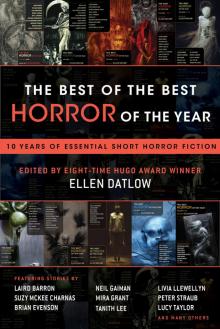 The Best of the Best Horror of the Year
The Best of the Best Horror of the Year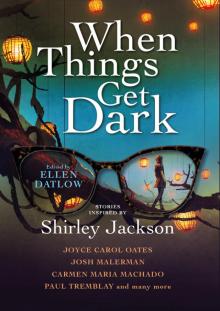 When Things Get Dark
When Things Get Dark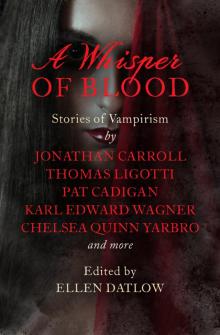 A Whisper of Blood
A Whisper of Blood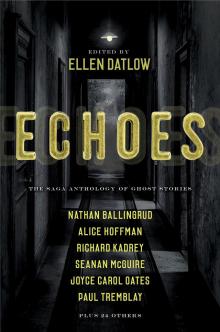 Echoes
Echoes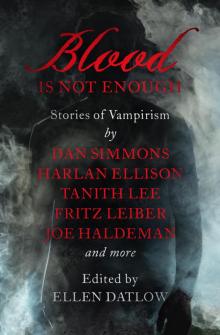 Blood Is Not Enough
Blood Is Not Enough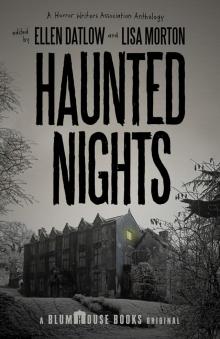 Haunted Nights
Haunted Nights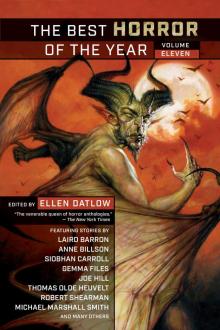 The Best Horror of the Year Volume Eleven
The Best Horror of the Year Volume Eleven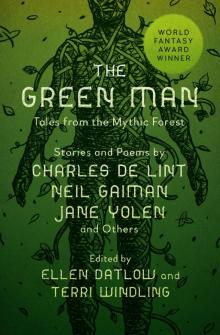 The Green Man
The Green Man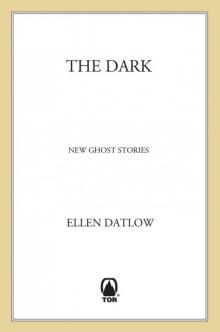 The Dark
The Dark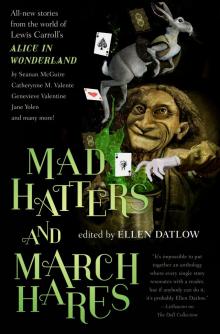 Mad Hatters and March Hares
Mad Hatters and March Hares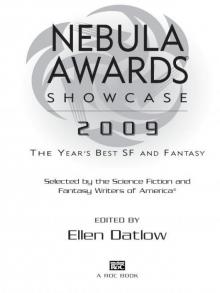 Nebula Awards Showcase 2009
Nebula Awards Showcase 2009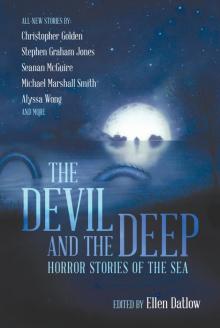 The Devil and the Deep
The Devil and the Deep